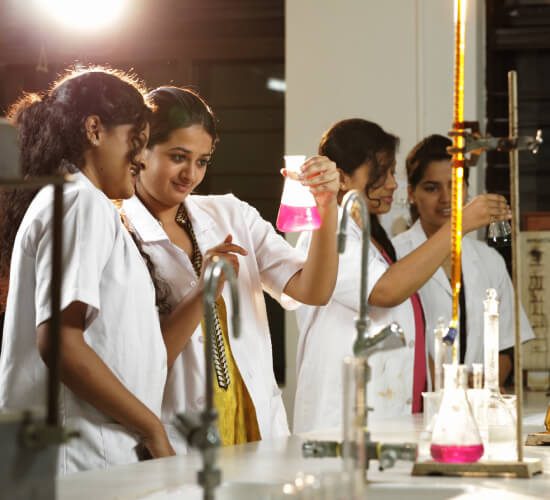Overview:
DEPARTMENT OF CHEMICAL ENGINEERING
Chemical Engineering Department at the SDMCET, Dharwad was established in the year 1995. The department is affiliated to Visvesvaraya Technological University, Belagavi, and accredited thrice. The sanctioned intake of the department is 30 for the Undergraduate program i.e. B.E. in Chemical Engineering. The department so far has produced 22 batches of graduates who are well placed in the industries and academic institutions across the country and overseas as well. There are 7 experienced faculty members including 4 Ph.D holders guiding to cater to the needs of industry and community at large. The curriculum is updated every year by inviting suggestions from the industry experts, distinguished alumni, and academicians from the premier institutes like IITs, NITs, and other Universities who are members of Board of Studies committee. The department through the cell for Industry-Institute Interface (III) at the college level organizes industrial visits, training in soft skills, guest lectures, alumni talk, seminars, workshops and symposiums etc., so as to bridge the gap between industry and academia.

This has indeed made the department attain the status of being in the limelight and recognition which truly speaks about the governance with always a look ahead. The department is recognized by VTU as research center, and it has received a funding worth 62 lakhs from VGST, Bangalore in different categories and three students have registered for Ph.D in the research center. Department has produced one PhD from research center and good number of publications in Scopus indexed journals. The students have also received funding from KSCST, Bangalore consistently every year. Students on an average of 75% are well placed in companies like AkzoNobel, Epsilon, JSW paints, MCF Mangalore, Biocon Bangalore, Navy Biologicals Hubli, Nandu Chemical Hubli, Shilpa Medicare Raichur, Zuari Agro Chemicals Goa, Shree cements, JK cements Bagalkot, Akay Industry Hubli, West Coast paper mill Dandeli, Tech Mahindra Bangalore, TCS Bangalore etc. Students on an average of 8-10% have taken up higher studies in reputed institutions across the country and abroad.
- Year of Establishment: 1995
- Head of Department: Dr. Shivanand Y. Adaganti
- NBA Accreditation Status: UG Program accredited by NBA in Tier-I from 2018-2021.
- Current Intake: 30
- Phone Number: 9448789996 | 0836-2328201

Vision:
To develop proficient Chemical Engineers to meet industrial and societal needs.
Mission:
- To design the curricula in tune with industry.
- To inculcate research culture with ethics to disseminate knowledge.
- To collaborate with industry and academia for sustainable growth.
PEOs & POs
Programme Educational Objectives(PEOs)
UG – Chemical Engineering: PROGRAM EDUCATIONAL OBJECTIVES (PEOs)
| PEO 1 | Analyze, design and professionally practice in the area of Chemical Engineering and allied disciplines by acquiring good knowledge of basic sciences and Chemical Engineering. |
| PEO 2 | Create applications to solve real-life problems of Chemical Engineering in a broad range of career path to fulfill ethical, economical, environmental and social responsibilities. |
| PEO 3 | Pursue higher studies and carry out research in Chemical Engineering and allied Engineering and Management. |
| PEO 4 | Work in multidisciplinary teams with good communication skills and leadership qualities to solve engineering problems and develop entrepreneural skills. |
Programme Outcomes(POs)
UG – Chemical Engineering: PROGRAM OUTCOMES (POs)
Engineering Graduates will be able to:
| PO | Short Title of the PO | Description of the Programme Outcome (PO) Engineering Graduates will be able to: |
|---|---|---|
| PO-1 | Engineering knowledge | Apply the knowledge of mathematics, science, engineering fundamentals, and an engineering specialization to the solution of complex engineering problems. |
| PO-2 | Problem analysis | Identify, formulate, review research literature, and analyze complex engineering problems reaching substantiated conclusions using first principles of mathematics, natural sciences, and engineering sciences. |
| PO-3 | Design/development of solutions | Design solutions for complex engineering problems and design system components or processes that meet the specified needs with appropriate consideration for the public health and safety, and the cultural, societal, and environmental considerations. |
| PO-4 | Conduct investigations of complex problems | Use research-based knowledge and research methods including design of experiments, analysis and interpretation of data, and synthesis of the information to provide valid conclusions. |
| PO-5 | Modern tool usage | Create, select, and apply appropriate techniques, resources, and modern engineering and IT tools including prediction and modeling to complex engineering activities with an understanding of the limitations. |
| PO-6 | The engineer and society | Apply reasoning informed by the contextual knowledge to assess societal, health, safety, legal and cultural issues and the consequent responsibilities relevant to the professional engineering practice. |
| PO-7 | Environment and Sustainability | Understand the impact of the professional engineering solutions in societal and environmental contexts, and demonstrate the knowledge of, and need for sustainable development. |
| PO-8 | Ethics | Apply ethical principles and commit to professional ethics and responsibilities and norms of the engineering practice. |
| PO-9 | Individual and team work | Function effectively as an individual, and as a member or leader in diverse teams, and in multidisciplinary settings. |
| PO-10 | Communication | Communicate effectively on complex engineering activities with the engineering community and with society at large, such as, being able to comprehend and write effective reports and design documentation, make effective presentations, and give and receive clear instructions. |
| PO-11 | Project management and finance | Demonstrate knowledge and understanding of the engineering and management principles and apply these to one’s own work, as a member and leader in a team, to manage projects and in multidisciplinary environments. |
| PO-12 | Life-long learning | Recognize the need for, and have the preparation and ability to engage in independent and life-long learning in the broadest context of technological change. |
Programme Specific Outcomes (PSOs)
UG – Chemical Engineering: PROGRAM SPECIFIC OUTCOMES(PSOs)
| PSO 1 | Plant operations and Control | Conceptualize the knowledge and information gained in mass and energy balance, thermodynamics, transport phenomena, kinetics, unit operations, process control, equipment design that can be used in design, control and optimizing the Chemical processes. |
| PSO 2 | Quality, Feasibility and impact studies | Develop an integrated process and modify it attributing to economy, environmental friendly, ethics coupled with safety by applying principles of chemical engineering. |
| PSO 3 | Development of engineering solutions through experiments | Apply knowledge of chemical engineering in solving both industry and academic problems using experimental methods including design of experiments and simulation to analyze, interpret and present the data. |
Faculty

Dr. Shivanand Y Adaganti
Professor & HOD

Prof. Ashoka H. S.
Assistant Professor

Prof. S. S. Inamdar
Assistant Professor

Dr. Keshava Joshi
Associate Professor & Dean Administration

Dr. Lokeshwari Navalgund
Associate Professor

Dr. Rashmi S. H.
Assistant Professor

Prof. Kirankumar Rathod
Assistant Professor
Syllabus
| UG |
| Chemical – II Year Chemical 2025-26 – 22 Scheme Chemical – III Year Chemical 2025-26 – 22 Scheme Chemical – IV Year Chemical 2025-26 – 22 Scheme |
Timetable
|
III Sem Chemical Time_Table_for_2025-26 V Sem Chemical Time_Table_for_2025-26 VII Sem Chemical Time Table 2025-26 |
Space, Infrastructure & Facilities
| Space, Infrastructure & Facilities |
Placement Details
| Placement Details 2022-23 |
Research
| Research Facilities |
| Engineering Faculty sponsored Projecs |
| Engineering Reserach Center Information |
| Engineering Students Funded Projects |
